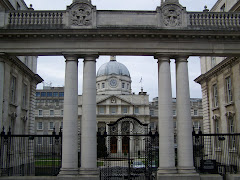Boardroom pay at the UK's top companies soared 37% last year as full-time directors were rewarded with inflation-busting increases in basic salaries, big cash bonuses and substantial payouts from share schemes.
The surge in pay, which takes the average total pay for a chief executive to £2,875,000, is more than 11 times the increase in average earnings and nearly 20 times the rate of inflation as measured by the consumer price index.I've copied the above from
this article. It is a long article so here is another extract:
Mr (Brendan) Barber(TUC General Secretary) said: "It is impossible to believe that top directors have become so much more productive than the rest of their staff over the last year. This growing gap is not just morally offensive but hits workforce morale, feeds through into house price inflation and threatens social cohesion. Britain's boardrooms are slowly losing touch with reality."
Miles Templeman, director general at the Institute of Directors, said "exceptional performance should be rewarded" and pointed out that pension funds would also benefit from a rising stock market. Like this guy for example?
Lord Browne, the former chief executive of BP, received £11m. He was forced to step down earlier this year after it was revealed he had lied in court.The thing that puzzles me though is I keep hearing about the need for wage restraint. So why does this only appear to apply to the public sector? Why are city institutions, whose massive bonus's must surely fuel inflation, excluded from this necessity?
As a local government worker I was offered a 2% pay rise back in April. Seeing as how inflation then was running at 4.6% we weren't best impressed. The Unions are still arguing with the employers (without any sign of success) that 2% is derisory and has to be increased. Yesterday talking at the TUC Conference Gordon Brown said he would not budge on the below inflation pay rises throughout the public sector, and furthermore, threatened to do the same again over the next two years. Today the talk in the media is about the irresponsibility of the Unions for threatening co-ordinated industrial action over the issue of pay. I wonder how many of those pontificating earn less than the £21,000 50% of the population are expected to make ends meet on?
Why isn't there a national outcry about the wage packets in the City when poorly paid workers are attacked for so much as a hint they may take action over below inflation pay offers?
I only ask because I genuinely don't get it.
Someone else expresses it better than I could...but I expect he got his idea for his article from here.
"Nurse! She is delusional again!"






4 comments:
Same over here. Big bosses get big bonuses, even if their companies lost money and stock prices went down, while lower level workers are laid off. But the rich run things, so that is the way it is.
MPs always vote themselves a nice fat pay rise whilst asking eryone else to show restraint!
The top bods in the local authorities and other government bodies seem to be doing very nicely too JJ. five bosses retired from our district council last year, cost us tax payers ( population of the whole district 48,000) over a £million in payoffs. If you work for the government then they're the ones you should be comparing yourself with. Furthermore, top government people's wages and pensions come directly out of the pay packets of the rest of us, before we can pay for mere fripperies like clothes and food, with no say in the matter on our part and we're not all big city bosses you know, not in my street anyhow..
Joe - the rich never seem to lose out or have to take repsonsibility for failure. Must be nice for them - bless.
Gill, an example from the MP's would be very refreshing wouldn't it? Suspect hell might freeze over first though.
Arthur, same with our authority too. It is scandalous the pay offs these failures manage to walk away with. I saw your comment in the article I just linked to btw.
Post a Comment